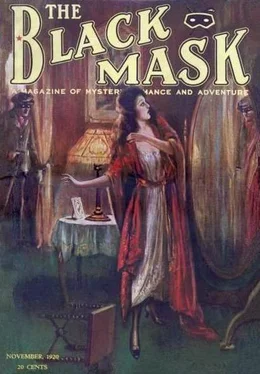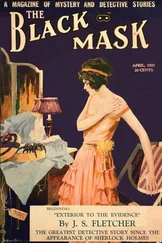Hamilton Craigie - The Black Mask Magazine (Vol. 2, No. 2 — November 1920)
Здесь есть возможность читать онлайн «Hamilton Craigie - The Black Mask Magazine (Vol. 2, No. 2 — November 1920)» весь текст электронной книги совершенно бесплатно (целиком полную версию без сокращений). В некоторых случаях можно слушать аудио, скачать через торрент в формате fb2 и присутствует краткое содержание. Город: New York, Год выпуска: 1920, Издательство: Pro-distributors Publishing Company, Жанр: Классический детектив, на английском языке. Описание произведения, (предисловие) а так же отзывы посетителей доступны на портале библиотеки ЛибКат.
- Название:The Black Mask Magazine (Vol. 2, No. 2 — November 1920)
- Автор:
- Издательство:Pro-distributors Publishing Company
- Жанр:
- Год:1920
- Город:New York
- ISBN:нет данных
- Рейтинг книги:5 / 5. Голосов: 1
-
Избранное:Добавить в избранное
- Отзывы:
-
Ваша оценка:
- 100
- 1
- 2
- 3
- 4
- 5
The Black Mask Magazine (Vol. 2, No. 2 — November 1920): краткое содержание, описание и аннотация
Предлагаем к чтению аннотацию, описание, краткое содержание или предисловие (зависит от того, что написал сам автор книги «The Black Mask Magazine (Vol. 2, No. 2 — November 1920)»). Если вы не нашли необходимую информацию о книге — напишите в комментариях, мы постараемся отыскать её.
The Black Mask Magazine (Vol. 2, No. 2 — November 1920) — читать онлайн бесплатно полную книгу (весь текст) целиком
Ниже представлен текст книги, разбитый по страницам. Система сохранения места последней прочитанной страницы, позволяет с удобством читать онлайн бесплатно книгу «The Black Mask Magazine (Vol. 2, No. 2 — November 1920)», без необходимости каждый раз заново искать на чём Вы остановились. Поставьте закладку, и сможете в любой момент перейти на страницу, на которой закончили чтение.
Интервал:
Закладка:
In the midst of this glow, surrounded by tiny reeling stars, he saw The White Lotus... burning with the fire of palest moons—a figure that faded, became as destroyed moonlight, a vanishing glory that perished the very instant that it flashed to light his way.
“Ia ora na i te Atua...”
Dark sluice-gates closed upon him.
V.
“ ’Ere she goes, mateys—look!”
That was the first thing that Cardigan heard, a sentence that clove the fabric of unconsciousness and left him lying, pained to the soul, in what seemed a vast, misty cavern.
He felt intermittent sprays upon his face and tried to struggle to a sitting position, but an intense burning in his skull made him fall back. He opened his lips.
“Charlie... where are you?”
An instant afterward a huge face, seeming wraithlike in the fog, materialized in the dusky vacancy above him.
“She’s just gone down, sir!” the third mate said in a husky voice. “Gawd, it was orful... with the little fool aboard—”
“You mean—?”
“Yerss. ’E dragged you up the companionway and Hi ’elped lower you into the long-boat... We’d ’ardly got away, sir, when she went back orf the rocks... straight down.” He paused, then: “Shall Hi call the roll, sir?”
Cardigan shuddered involuntarily. “Yes.”
He saw English Charlie rise; his head was lost in the mist.
“Watkins!” began the Britisher.
“Here!”
“Sykes... Ladd... Cheng Su... Olsen... Huldricksson... Hickey—”
“The nigger was locked in the brig,” put in a voice from the rear.
“Stearns!” went on the cockney. “Moncrief—”
“He went overboard...” This from Cardigan in a half-whisper.
Then, “Bjornsen...”
But Bjornsen did not answer. Nor could anyone account for the big Norwegian.
Cardigan went to his grave wondering who had struck Black Michael first, ’Poleon Moncrief or The Boy.
And perhaps the spirit of Bjornsen, knowing this and possessing a grim sense of humor, chuckled.
But do dead men laugh?
The Mystery of the Marseilles Express
by J. C. Kofoed
I
The card they found in his pocket read:
He was lying in a first class compartment of the Paris-Marseilles express, his throat cut from ear to ear. The only other occupants of the carriage were a blind man and a gentle old lady of eighty, who was hysterical from shock.
II
The Rue Cannabiere is at once the Broadway and the Boulevard des Italiens of Marseilles, and it is more cosmopolitan than either. Between the big stores, the glittering cafés, restaurants and theaters that flank its width, walk yellow men from China, brown from India, black men from Bermuda or the Soudan, Arabs, Portuguese, Italians and Yankees. Turban and fez are as common on the Cannabiere as silk stockings and painted lips.
William F. Bailey, special agent for the Department of Justice, sat in a corner of the Restaurant Haxo, absorbed in a magnificent omelette and a cup of chocolate. The warm June sun sprayed through the windows, lacing floor and furniture with thongs of gold. From the window he could see the Vieux Port, with its bristle of masts. His unopened copy of the Matin was propped against a cruet on the center of the table.
Bailey had been in France a year, seeking “Beau” Nash, who was wanted in the United States on a dozen charges. Nash was of the highest type of criminal, but a man who had made enemies gratuitously. He kicked out of his path men who had enabled him to make a success of his nefarious calling. But even with information from a number of these Bailey had been unable to trace the old fox. “Railroad” Cartwright had failed to “get” the Beau in his day—failed, with a great incentive to urge him on; and so had a dozen others.
The agent thought of the words ©f Eddie Lenoir, when that disconsolate forger was last arrested:
“It ain’t no use,” Eddie had said; “things have got so with the wireless an’ cables an’ international police that there ain’t nowhere in the world a man can go where a red-faced Irishman with a badge won’t tap him on the shoulder an’ say, ‘Hello, Eddie, the old man wants to see you.’ Only one bird’s got you dicks stopped, an’ that’s Beau Nash.
Bill recalled, with a grin of disgust, his answer, “Oh, we’ll get him all right. It’s only a matter of time.”
He had a year, and from all indications was no closer to his quarry than when he started. Well, if Denise Girard, whom he loved, married him, Bailey could hardly call his European trip a failure, even though it might seem so in the eyes of his superiors.
The chatter of two men, drinking wine at a nearby table, annoyed him. One was tall and gaunt; the other stoop shouldered, slack chinned, pinched. Bailey, subconsciously, had heard the entire conversation. Apparently the big man was berating the other rather too harshly for that gentleman’s taste. He wound up with a gust, “Name of a dog, but you are a fine one to call yourself a railway man. Not all the way did I see you—lazy lizard—”
The little man sprang up, with a snarl at the edge of his lips. Then he glanced around, hesitated, and after a moment slouched out.
Bill yawned, and picked up his paper. In a flash his bored air dropped from him, and he stiffened with amazement. It was not the headlines telling of the death of Monsieur Bertal, but the. fact that the dead chemist’s photograph was that of Beau Nash!
It required just two minutes for the agent to pay his bill and leave the Restaurant Haxo. The Prefecture of Police was only a short distance away, but fifty Frenchmen shrugged their shoulders and exclaimed anent the mad hurry of Americans as Bailey dashed by.
The prefect greeted him politely. Of a certainty the body was in the mortuary, and if Monsieur Bailey desired to view it there could be no possible objection. It also happened that the two occupants of the compartment at the time of the murder were in the prefecture, and it would be possible to speak with them. It was hoped that the distinguished American secret agent might aid them in this ease.
Bailey followed a glum gendarme down a corridor to the room where the unfortunate flotsam of the city so often paid their final visits. There was something on one of the slabs—a rigid something covered with a white cloth. The agent turned down one corner of the sheet, and then replaced it. His search was ended. The lean face and drooping mustache, the graying yellow hair—It was Beau Nash beyond a doubt!
“You recognize him, monsieur?” asked the prefect, who had followed Bailey into the mortuary.
The American told him.
“It is not surprising to me. There is a chemical engineer named Bertal, who resides in Marseilles, but we learned that he is at home, having returned from Paris last night. And now, monsieur, if you will come with me to the office we will speak with Madame Berthier, who was in the compartment at the time of this man’s death.”
Madame Berthier, a delicate little lady of eighty, told Bailey, in a frightened voice, all she knew of the affair. No one in their senses could have suspected her; but the frightful experience had shaken her to the soul.
“We had passed Lyons, monsieur,” she explained. “It was late, nearly two in the morning. I was dozing. Monsieur Bertal was asleep in the corner directly opposite me; the blind man, Monsieur Robert, was beside him. The door of the compartment had been locked after we left Lyons. There was a young woman wearing a heavy veil in the next compartment when we left Paris. The police found no one else in the car but us when they investigated.”
Читать дальшеИнтервал:
Закладка:
Похожие книги на «The Black Mask Magazine (Vol. 2, No. 2 — November 1920)»
Представляем Вашему вниманию похожие книги на «The Black Mask Magazine (Vol. 2, No. 2 — November 1920)» списком для выбора. Мы отобрали схожую по названию и смыслу литературу в надежде предоставить читателям больше вариантов отыскать новые, интересные, ещё непрочитанные произведения.
Обсуждение, отзывы о книге «The Black Mask Magazine (Vol. 2, No. 2 — November 1920)» и просто собственные мнения читателей. Оставьте ваши комментарии, напишите, что Вы думаете о произведении, его смысле или главных героях. Укажите что конкретно понравилось, а что нет, и почему Вы так считаете.












